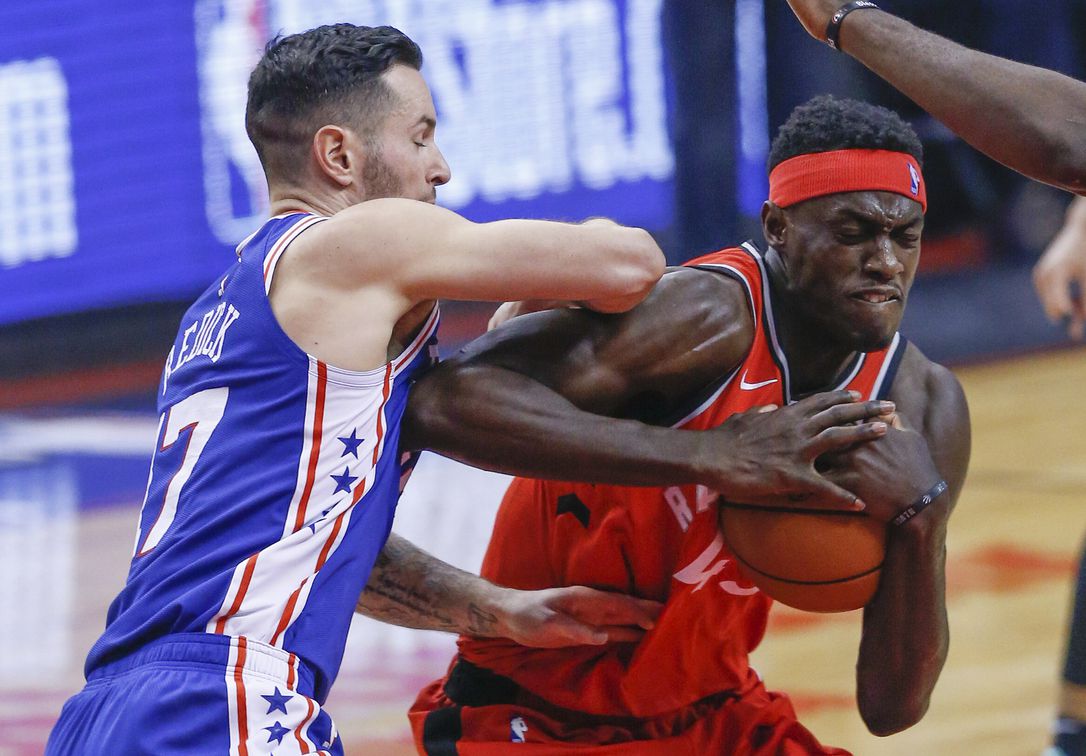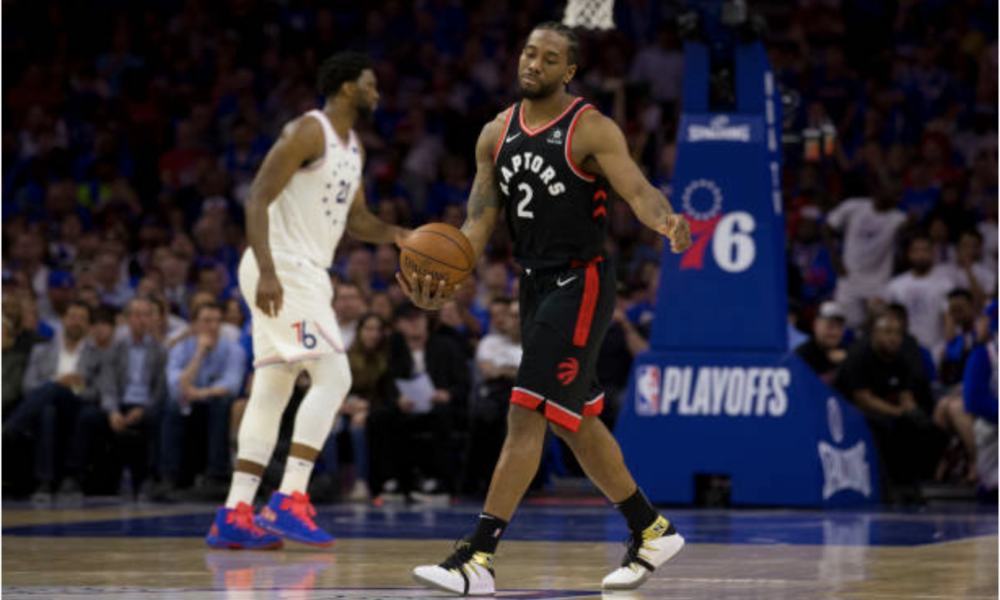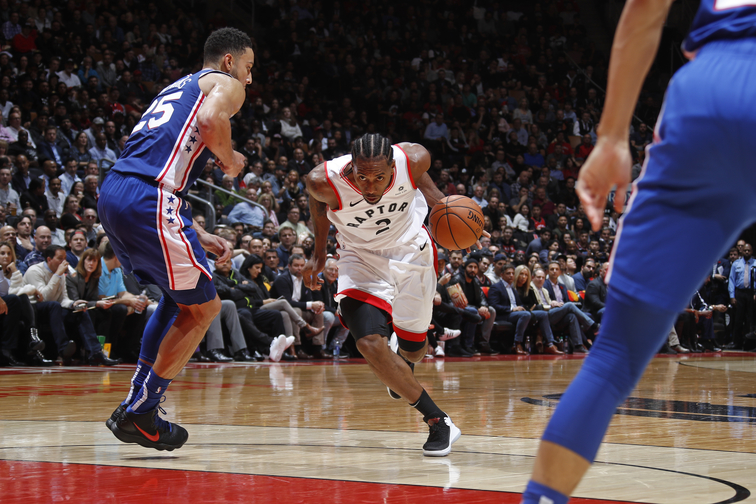We are now faced with our first ‘what just happened’ of the Toronto Raptors’ 2018-19 playoff run. Game three was a decidedly inexplicable phenomenon. I did my best to explain it here, but the results was as unexpected as this next game is unpredictable. Will the Raptors even the series and prove that the loss was simply a bad loss against a good team? Or will the Raptors fall again and continue hearing the deafening bluster from fans and pundits across North America about the franchise’s history of failure? Who’s to say?
Colin Connors has a great gameday post prepping the game here.
If the Raptors are going to fix the result, they need to solve a number of problems on the court. Toronto’s offense is having trouble producing shots around the rim, shooting 48 percent at the rim as a team in game three. (As a point of comparison, the only Raptors to shoot under 50 percent at the rim during the regular season were Jeremy Lin and Lorenzo Brown.) And the entire jigsaw puzzle is based around shooting at the rim. Toronto is a good shooting team, but they are at their best hitting triples after the ball touches the paint. And the ball just hasn’t been doing much of that. The Raptors attempted fewer than 5 percent of their shots from the corner in game three, fewer than any game in 2018-19.
Pascal Siakam did not solve the problem of Joel Embiid guarding him, but even when he had other players defending, he seemed to be rushing his attempts in game three. He rushed into the paint and flung up uncharacteristically inaccurate looks. Siakam is Toronto’s best paint scorer, and his right thigh contusion adds a whole other element of difficulty to Toronto’s gameplan. Leonard remains an elite paint attacker, but few other Raptors can create their own shot in the paint against Philadelphia’s size.
Otherwise, Toronto needs to start making its open jumpers. Fred VanVleet is 1-for-11 in the series, but his spot in the rotation isn’t going anywhere. He is riding the struggle bus, but he can’t stop shooting. Against a team as gigantic and athletic as Philadelphia, refusing to shoot an open jumper is worse for an offense than missing it. They rotate so quickly that if you hesitate, the defense resets, and you’re stuck attacking without an advantage. That’s how turnovers happen. The Raptors are far too stagnant on both ends.
Lowry is going to have to turn back the clock. With the Sixers loading up so heavily on Leonard, cheating off of Toronto’s supposed shooters, Lowry will need to connect on every open shot he sees. He can’t turn them down to drive, as he’s been doing in the last two games. Butler is completely ignoring Lowry on the defensive end, and Lowry usually positions himself several feet behind the three-point to create an easier passing angle. But if the pass comes, Lowry is in position to shoot or attack; he could stay on the arc, ready to shoot if Butler doubles from one pass away. When Lowry has the ball, the Sixers are treating him like a non-shooter and even going under screens. He’s been hesitant to launch what used to be his patented shot, the pull-up triple from above the break.
Defensively, the Raptors had the blueprint in the first two games but went away from it. They failed to contain the ball in transition, which sparked unnecessary rotations and gave Philadelphia endless mismatches and layups. The team lost focus. That happens, but Toronto will want to make it a blip instead of a trend. Game four is where they can prove that.
Oren Weisfeld dove into some of his own potential solutions here, while Anthony described how Toronto needs more from the bench here.
Toronto Injury Updates
Pascal Siakam (right thigh contusion) is a game-time decision. He has been working out, but Nurse has not given official word either way. Chris Boucher (back spasms) is out, as is OG Anunoby (appendectomy). Jeremy Lin (back spasms) is probable after previously being listed as out. So, lots here.
PG: Kyle Lowry, Fred VanVleet, Jeremy Lin
SG: Danny Green, Patrick McCaw, Jodie Meeks
SF: Kawhi Leonard, Norman Powell, Malcolm Miller
PF: Pascal Siakam
C: Marc Gasol, Serge Ibaka, Eric Moreland
Philadelphia Injury Updates
Mike Scott (right heel) is no longer listed on the injury report, and neither is Joel Embiid (left knee soreness) or Greg Monroe (ankle sprain). Basically, the Sixers are fully healthy.
PG: Ben Simmons, TJ McConnell
SG: JJ Redick, James Ennis, Furkan Korkmaz
SF: Jimmy Butler, Jonathon Simmons
PF: Tobias Harris, Mike Scott, Jonah Bolden
C: Joel Embiid, Greg Monroe, Boban Marjanovic, Amir Johnson
Rotation Notes
- After the focus for the first series was how dominant were Toronto’s starters, the spotlight is now firmly on Kawhi Leonard alone. His on-off splits against Philadelphia are ridiculous. When he is on the court, Toronto has a +7.2 net rating. When he leaves, it falls to -52.5. All of Toronto’s starters have a higher on-rating than off-, but no other dropoff is nearly as pronounced as Kawhi’s. When he’s playing. Toronto can score. When he’s on the bench, they cannot. It’s that simple.
- The starters had their first bad game together in game three. They finished -12 in 20 minutes, which spells disaster for Toronto. If the starters can’t win their minutes, Toronto surely won’t get over the hump when the struggling VanVleet or Serge Ibaka are in the game. Philadelphia has done a great job of mitigating their depth issues with clever rotation tweaks, but Nick Nurse has not followed the same script. Game four could potentially be a chance to see whether that happens, but don’t count on Nurse dramatically altering the rotation after eight straight games of the same basic framework.
- Toronto did have some lineups in game three that won their minutes. The two best (+4 and +3) both had the trio of Danny Green, Leonard, and Siakam together. That switchable group of wings is Toronto’s best hope on both ends. Green and Leonard have shown fantastic chemistry since arriving together from San Antonio, and that has continued into the playoffs.
- James Ennis was in four of the Sixers’ five best lineups in game three. Sure, Philadelphia’s starters are talented, so it’s a logical thing that they win their minutes. Ennis is not as threatening as guys like Ben Simmons or JJ Redick, whom he’s replacing. Toronto needs to find a way to punish Philadephia when Ennis is on the floor.
- When Toronto is only winning some minutes on the back of one singular talent, and losing minutes no matter which of Philadelphia’s players are on the floor, that points towards a differentiation of gameplans. Toronto’s just isn’t working, and they can’t rely on Leonard being so good that it lifts the Raptors to victory. The Sixers are too good for that.
Assorted
- At a certain point, analysis slips into cliché. We can talk about analytic fixes, like shooting when you’re open, using Siakam as the handler in the pick-and-roll rather than the screener, involving Redick in screening actions, getting paint touches, etc. But when Toronto is failing to accomplish all of those desired outcomes, there’s a deeper root cause. That’s why Nurse has spent so much of his time in between games three and four discussing clichés like physicality and heart. Toronto hasn’t been playing with force, hasn’t been decisive. That’s a cliché, but it’s also an accurate reason why Toronto wasn’t ready for game three. Let’s take a common play, the pick-and-roll. Leonard has the ball, and Green screens for him. The goal here is to trigger a switch or force Redick to hedge for a moment, hopefully giving Leonard a chance to shoot when he drops back to Green. But if Green doesn’t make contact, Simmons can stay with Leonard, and there’s no opening. Meanwhile, Toronto’s weakside isn’t moving, which means that Butler (ostensibly guarding Lowry) can cheat onto the strongside nail to dissuade Leonard from driving. But because Leonard has no space, his pass to Lowry is late, meaning Lowry isn’t ready to shoot. Toronto now has only a few seconds left on the shot-clock with Lowry isolating against Butler. That’s been the result of so many plays, and it comes because of boring basketball analysis. But the fact remains, Toronto needs to play with more force, more energy, and more activity. All boring analysis, but all true.
- The Meeks memorial minutes is mothballed. Not to slander Meeks, as he’s been doing his best, but it’s hard to play well for one minute a game. He has a -90.1 net rating in the series outside of garbage time, so hopefully Meeks’ numbers are moot going forward.
- Refs are Marc Davis, Tony Brothers, Josh Tiven.
The Line
- For the first time in the playoffs, Toronto is the underdog in a game. Philadelphia is -3, after the line opening at -1.5. Money still heading towards the Sixers. Over-under of 215.5.



